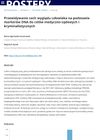 December 2006 in “8th European Congress of Endocrinology incorporating the British Endocrine Societies”
December 2006 in “8th European Congress of Endocrinology incorporating the British Endocrine Societies” Men with early hair loss and hormonal changes like PCOS could be the male equivalent of PCOS, not linked to metabolic syndrome.
January 2006 in “Casopís lékar̆ů c̆eských” 89 citations,
October 2003 in “Biology of the Cell” Galectin-1 helps in RNA processing in cell nuclei.
4 citations,
June 2015 in “Connective tissue research” The research found changes in gene expression related to cell death in mouse skin that help understand hair follicle development and skin health.
 29 citations,
February 2004 in “Experimental and Clinical Endocrinology & Diabetes”
29 citations,
February 2004 in “Experimental and Clinical Endocrinology & Diabetes” Men with early balding often have hormone levels similar to women with polycystic ovary syndrome.
 12 citations,
December 2005 in “PubMed”
12 citations,
December 2005 in “PubMed” Some men with early hair loss may have similar hormonal changes to women with Polycystic ovary syndrome, and could be at risk for developing type 2 diabetes.
 4 citations,
January 2024 in “JEADV. Journal of the European Academy of Dermatology and Venereology/Journal of the European Academy of Dermatology and Venereology”
4 citations,
January 2024 in “JEADV. Journal of the European Academy of Dermatology and Venereology/Journal of the European Academy of Dermatology and Venereology” Baricitinib and ritlecitinib are recommended for severe alopecia areata, with other treatments available off-label.
2 citations,
April 2022 in “Genes” The study found that the hair loss condition in Cesky Fousek dogs is influenced by multiple genes affecting skin and muscle structure, fat metabolism, and immunity.
 1 citations,
January 2021 in “Prague medical report”
1 citations,
January 2021 in “Prague medical report” Men might have a version of the female disease, polycystic ovarian syndrome, shown by changes in hormone levels and early baldness, but more research is needed to fully understand it.
 June 2024 in “Skin Appendage Disorders”
June 2024 in “Skin Appendage Disorders” Both PRP and MZT treatments can significantly improve hair growth in patients with androgenetic alopecia.
 March 2023 in “Journal of Education, Health and Sport”
March 2023 in “Journal of Education, Health and Sport” Women with Polycystic Ovary Syndrome have a higher chance of getting depressed.
 July 2022 in “Postepy biochemii”
July 2022 in “Postepy biochemii” DNA markers can predict physical traits for forensic use, but there are ethical and technical challenges.

I cannot provide a conclusion without the content of the document.

Hair loss in women can cause beauty and mental health problems, and there are various treatments available.
44 citations,
January 2004 in “American journal of clinical dermatology” Understanding genetic mutations helps diagnose and treat skin disorders like ichthyosis.
39 citations,
November 1978 in “Annals of internal medicine” Spironolactone may help reduce excessive hair growth in women with high male hormone levels.
 20 citations,
August 2022 in “Archives of Medical Science”
20 citations,
August 2022 in “Archives of Medical Science” The Polish medical societies have redefined metabolic syndrome and recommend lifestyle changes, certain medications, and possibly bariatric surgery for treatment. They also discuss managing related health conditions.
14 citations,
March 2017 in “Genes and immunity” Certain microRNAs may help treat alopecia areata by targeting immune pathways.
13 citations,
July 2019 in “Chemical papers/Chemické zvesti” A new sensor can detect minoxidil accurately and effectively.
12 citations,
June 2001 in “PubMed” CE-PTG is a better method for analyzing hair growth in androgenetic alopecia.
8 citations,
March 2011 in “Endocrine” A new gene mutation causes vitamin D-resistant rickets and hair loss in two siblings.
 3 citations,
December 2020 in “Polski merkuriusz lekarski : organ Polskiego Towarzystwa Lekarskiego”
3 citations,
December 2020 in “Polski merkuriusz lekarski : organ Polskiego Towarzystwa Lekarskiego” People with androgenetic alopecia often experience high stress, but the stress doesn't affect how the disease progresses or how well different treatments work.
3 citations,
May 2013 in “PubMed” Research on Hutchinson-Gilford progeria syndrome could help understand normal aging and heart disease.
1 citations,
March 2024 in “Nanomaterials” Biomimetic scaffolds are better than traditional methods for growing cells and could help regenerate various tissues.
1 citations,
September 2021 in “Dermatologic Therapy” AC5 improves hair loss and hair quality with high satisfaction rates.
1 citations,
January 1987 in “PubMed”  August 2024 in “Archives of Dermatological Research”
August 2024 in “Archives of Dermatological Research” Androgenetic alopecia may be linked to metabolic syndrome.
 August 2024 in “International Journal of Medicine”
August 2024 in “International Journal of Medicine” COVID-19 can cause hair loss, and managing it involves counseling, diet changes, and treatments.

Commercial and open-source light sheet microscopy systems have advanced through engineer-scientist collaborations, improving imaging quality.

Fat tissue can potentially treat a common form of hair loss called androgenic alopecia.
















